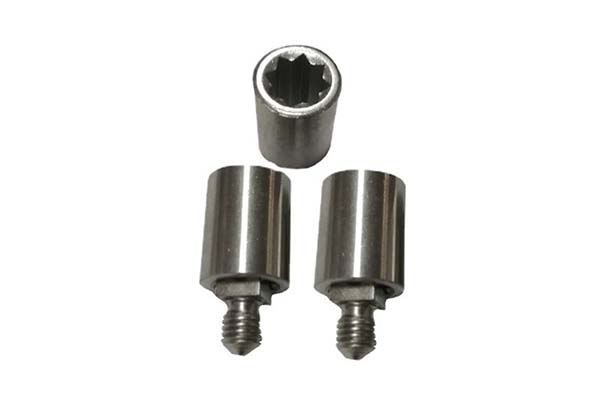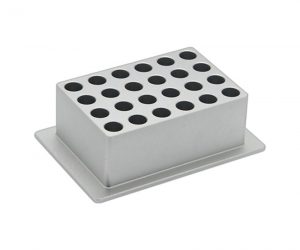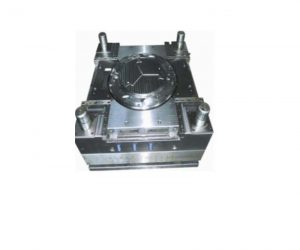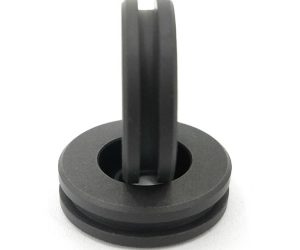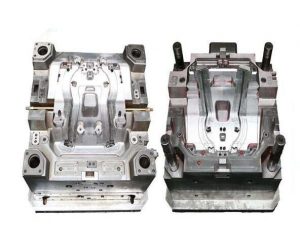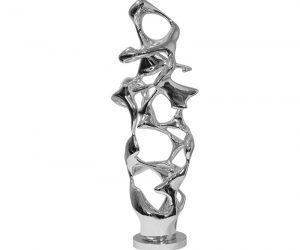1. What is CNC Precision Machining
2.1 Definition
CNC precision machining, short for Computer Numerical Control precision machining, is a highly advanced manufacturing process. It utilizes pre - programmed computer software to control the operations of machining tools with extreme accuracy. This technology allows for the creation of parts and components with very tight tolerances, often in the range of micrometers. For example, in the aerospace industry, parts like turbine blades need to be manufactured with tolerances as small as ±0.001 inches. CNC precision machining ensures that these high - precision requirements are met consistently.
The process begins with a digital design created in Computer - Aided Design (CAD) software. This design is then converted into a set of instructions, known as G - code, through Computer - Aided Manufacturing (CAM) software. The G - code contains detailed information about the tool paths, spindle speeds, feed rates, and other machining parameters. The CNC machine reads these instructions and precisely controls the movement of the cutting tools relative to the workpiece, removing material layer by layer to achieve the desired shape and dimensions.
2.2 Core Components
- Computer Control System: At the heart of Yigu Technology CNC precision machining is the computer control system. This system interprets the G - code instructions and sends signals to the machine's motors to control the movement of the axes. High - end CNC control systems can handle complex mathematical calculations in real - time, ensuring smooth and accurate tool movements. For instance, Fanuc's high - performance CNC control systems are widely used in the industry for their reliability and advanced control capabilities.
- Machine Tools: CNC machine tools are designed to execute the machining operations with high precision. Common types include CNC mills, lathes, and grinders. CNC mills are capable of performing a variety of operations such as milling, drilling, and tapping. They can create complex 3D shapes by moving the cutting tool along multiple axes. CNC lathes, on the other hand, are used for turning operations, producing cylindrical parts with high precision. For example, a Haas CNC lathe can achieve a positional accuracy of ±0.0001 inches.
- Cutting Tools: The choice of cutting tools is crucial in CNC precision machining. Tools are selected based on the material being machined and the specific operations required. Carbide cutting tools are popular due to their high hardness and wear resistance, making them suitable for machining tough materials like steel and titanium. Diamond - coated tools are often used for machining non - ferrous metals and plastics to achieve a high - quality surface finish.
2.3 Comparison with Traditional Machining
| Comparison Items | CNC Precision Machining | Traditional Machining |
| Precision | Can achieve extremely high precision, often with tolerances in the micrometer range. For example, in the semiconductor industry, tolerances of ±0.001 mm can be achieved. | Generally has lower precision, with typical tolerances in the range of ±0.1 - 0.5 mm, depending on the skill of the operator and the type of equipment. |
| Efficiency | Once programmed, the CNC machine can operate continuously with high speed, reducing production time. It can also perform multiple operations in one setup. For instance, a complex part that might take hours to machine manually can be completed in a fraction of the time on a CNC machine. | Manual operations are time - consuming, and setting up for different operations can be labor - intensive and time - consuming. Production speed is often limited by the operator's physical capabilities. |
| Manpower Requirement | Requires skilled operators to program and monitor the machine, but one operator can often manage multiple CNC machines simultaneously. | Highly dependent on the skills of the operator. Complex operations may require highly skilled machinists, and more manpower is usually needed for large - scale production. |
| Complexity of Shapes | Capable of producing highly complex 3D shapes and intricate geometries with ease, as the computer - controlled tool paths can be precisely defined. | Difficult to create complex shapes accurately. Special fixtures and techniques are often required, which can be costly and time - consuming. |
| Consistency | Produces highly consistent parts. Once the program is set, each part will be identical within the specified tolerances. | There can be variations between parts due to human factors such as differences in operator technique, fatigue, etc. |
2. Why is CNC Precision Machining Important
4.1 In the Aerospace and Defense Industries
In the aerospace and defense sectors, the demand for Yigu Technology high - precision components is of utmost importance. These industries operate in extreme conditions where the smallest deviation can lead to catastrophic consequences. For example, in aircraft engines, turbine blades are subjected to high temperatures, extreme pressures, and high - speed rotations. A turbine blade produced for a modern jet engine might have a tolerance of ±0.001 inches. CNC precision machining is crucial in ensuring that these blades are manufactured with such tight tolerances.
The use of CNC precision machining in aerospace and defense also extends to the production of structural components. The fuselage of an aircraft, for instance, requires parts that fit together perfectly to ensure airtightness and structural integrity. CNC - machined parts can be produced with the exact dimensions needed, reducing the need for extensive post - production fitting and adjustment. According to a study by the International Aerospace Components Manufacturers Association, over 80% of critical aerospace components are now produced using CNC precision machining, which has significantly improved the safety and reliability of aircraft and defense systems.
4.2 In the Medical and Dental Fields
In the medical and dental industries, Yigu Technology CNC precision machining plays a vital role in the production of implants and surgical instruments. Implants, such as hip and knee replacements, need to be a perfect fit for the patient's body. A hip implant, for example, must match the patient's bone structure precisely to ensure proper function and long - term stability. CNC machining allows for the creation of custom - designed implants with high precision, using biocompatible materials like titanium and PEEK.
Surgical instruments also require high precision. Tools used in minimally invasive surgeries, such as robotic - assisted surgical arms, need to be extremely accurate to perform delicate procedures. The tips of these instruments may need to be machined to tolerances of ±0.01 mm. A research report by the Medical Device Manufacturers Association shows that the use of CNC precision machining in medical device production has led to a 30% reduction in surgical complications related to implant failure or instrument malfunction.
4.3 In the Automotive and Transportation Industries
In the automotive and transportation industries, CNC precision machining contributes significantly to improving vehicle performance and safety. Engine components, such as engine blocks, cylinder heads, and crankshafts, are critical for the engine's operation. An engine block needs to have precisely machined cylinder bores to ensure proper piston movement. The diameter of these bores may have a tolerance of ±0.05 mm. CNC precision machining ensures that these components are manufactured with the required precision, resulting in better engine efficiency, reduced emissions, and increased durability.
Transmission parts also benefit from CNC precision machining. Gears in a transmission system must mesh perfectly to ensure smooth power transfer. CNC - machined gears have consistent tooth profiles, reducing noise and wear. In a study by the Society of Automotive Engineers, it was found that vehicles with CNC - machined engine and transmission components had a 15% improvement in fuel efficiency compared to those with traditionally - manufactured components.
4.4 In the Electronics and Semiconductor Industries
The electronics and semiconductor industries demand extremely precise machining for the production of microchips, circuit boards, and other components. Microchips are the heart of electronic devices, and their performance depends on the precision of the manufacturing process. For example, in the production of a high - end computer processor, the circuit patterns on the chip may have features as small as 7 nanometers. CNC precision machining, in combination with other advanced techniques like photolithography, is used to create these tiny and complex structures.
Circuit boards also require Yigu Technology high - precision machining. The holes for components on a printed circuit board need to be drilled with great accuracy to ensure proper component placement. CNC - controlled drilling machines can achieve hole diameters with tolerances of ±0.01 mm. A report by the Semiconductor Industry Association indicates that the use of CNC precision machining has been instrumental in the continuous miniaturization and performance improvement of electronic devices, enabling the development of smaller, more powerful smartphones, laptops, and other gadgets.
3. Conclusion
In Yigu Technology conclusion, CNC precision machining is a revolutionary manufacturing process that has transformed the way parts and components are produced. Its ability to achieve high precision, handle complex geometries, and ensure consistent quality has made it an indispensable technology in modern manufacturing.
The various types of CNC machines, from mills and lathes to multi - axis and specialty machines like wire EDM, offer a wide range of capabilities to meet the diverse needs of different industries. Whether it's the aerospace industry demanding turbine blades with sub - millimeter tolerances, the medical field requiring custom - fit implants, the automotive industry seeking high - performance engine components, or the electronics sector needing micro - sized circuit patterns, CNC precision machining has proven to be up to the task.
The importance of CNC precision machining cannot be overstated. It has significantly improved the quality, reliability, and performance of products across multiple industries. By enabling the production of parts with tight tolerances, it has reduced the risk of component failure, enhanced product efficiency, and contributed to technological advancements.
The Yigu Technology CNC precision machining process, from design and programming to tool selection, machining, and inspection, is a well - organized and highly controlled sequence. Each step plays a crucial role in ensuring the final product meets the exacting standards of precision and quality.
As technology continues to advance, CNC precision machining will only become more sophisticated and capable. Yigu Technology Manufacturers and engineers are encouraged to stay updated with the latest developments in this field, invest in high - quality CNC equipment, and train their workforce to master the skills required for CNC precision machining. By doing so, they can take full advantage of this technology to create innovative products, gain a competitive edge in the global market, and contribute to the further progress of manufacturing and technology - driven industries.
